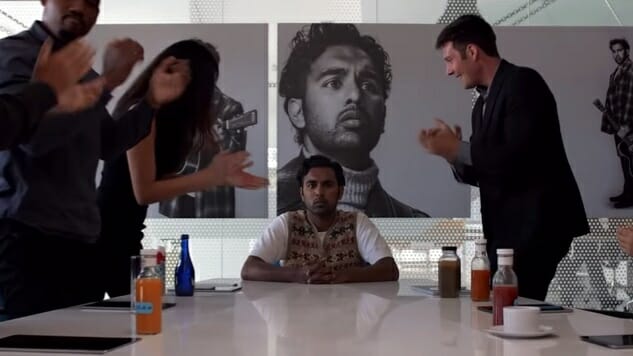In Yesterday, the Music of the Beatles Has Just Got to Be Free
Even from the men who made it

I was considered really, really weird for liking the Beatles as a high schooler some 20 years ago, right up until it seemed like everybody liked them. It was music that was given to me through my father, who owned every album and gleefully exposed me to the movie Yellow Submarine at an age where it made even less sense than it’s supposed to. The Beatles were a band that had lore behind them, whose every offhand comment to the press, major concert and infamous interpersonal feud had been breathlessly catalogued.
Note: This article contains some spoilers for Yesterday.

Everybody, at some point, comes to the Beatles, if not to worship them then to scoff about how enjoying their music is so basic (or convincingly point out they cribbed from other artists). The very premise of director Danny Boyle’s Yesterday seems to prove that everyone has an opinion on the Beatles, and that we all want to gawk at what sort of world it would be without the lads from Liverpool. (For one thing, one that also wouldn’t have Oasis.) It’s plainly unthinkable, and like a mob of screaming teens chasing after history’s biggest boy band, we’re enthralled. What’s interesting about this equal parts weird and hilarious thought experiment is that it’s completely removed from the Boomer nostalgia that defines Beatles mythologizing. The Beatles, Boyle is saying, belong to everybody.

Jack Malik (Himesh Patel) can’t catch a break as an artist until a bizarre worldwide power outage (set to the orchestral crescendo from “A Day in the Life,” naturally) ends in his being hit by a bus. Upon waking, he discovers he’s missing two front teeth and that nobody gets his glib references to Beatles lyrics. When he performs Paul McCartney’s solo “Yesterday,” his friends want to know how he came up with such an incredible song. McCartney himself has spoken about how the song came to him in a dream, and as such he initially was certain he’d heard his own song somewhere else. It’s a knowing wink during the surreal moment in which Jack’s situation first becomes clear to the audience.
At first, Jack’s motivations seem to be entirely selfish. Surely we’ve all fantasized about going back in time and writing a song, novel or screenplay before the artist who made it famous (or is it really just me?). Faced with the impossible windfall that is the Beatles’ entire song catalogue, Jack goes on an artistic tear, recreating all of them. It isn’t until fairly late in the film—after scenes where he’s desperately visited Liverpool landmarks to refresh his memory of some of the band’s more wandering lyrics—that another theme emerges. What would it really mean if you were the only person on Earth who remembered a monumental body of work?
-

-

-

-

-

-

-

-

-

-

-

-

-

-

-

-

-

-

-

-

-

-

-

-

-

-

-

-

-

-

-

-

-

-

-

-

-

-

-

-










































